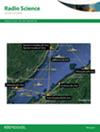地基微波辐射计抗噪 BP 神经网络反演算法的鲁棒性
IF 1.6
4区 地球科学
Q3 ASTRONOMY & ASTROPHYSICS
引用次数: 0
摘要
地基微波辐射计(MWR)可以获取高达 10 千米的温度和相对湿度的高时间分辨率大气剖面图。这些剖面图已广泛应用于气象观测领域。由于神经网络固有的脆弱性,该领域的一个重要问题是如何在神经网络反演的基础上提高 MWR 剖面的可靠性和稳定性。我们提出了一种深度学习方法,在 BP 神经网络反演(NBPNN)过程中添加噪声。对比无线电探空仪数据和 NBPNN 结果表明,如果 MWR 亮度温度误差在 -2-2 K 范围内,则通过 NBPNN 反演的温度曲线均方根误差(RMSE)为 2.15 K,相对湿度曲线均方根误差为 19.46 %。与传统的反向传播神经网络反演法反演的温度曲线和相对湿度曲线的误差相比,结果要小得多。比较结果表明,NBPNN 显著提高了在亮度温度误差条件下的反演精度和鲁棒性,可以降低对 MWR BT 精度的要求,实现 MWR 的长期稳定性。本文章由计算机程序翻译,如有差异,请以英文原文为准。
The robustness of an anti-noise BP neural network inversion algorithm for ground-based microwave radiometer
The ground-based microwave radiometer (MWR) retrieves atmospheric profiles with a high temporal resolution for temperature and relative humidity up to a height of 10 km. These profiles have been widely used in the field of meteorological observation. Due to the inherent fragility of neural networks, one of the important issues in this field is to improve the reliability and stability of MWR profiles based on neural network inversion. We propose a deep learning method that adds noise to the BP neural network inversion (NBPNN) process. Comparison of the radiosonde data and NBPNN results shows that if the error of MWR brightness temperature is in the range of − 2−2 K, the root-mean-square error (RMSE) of the temperature profile is 2.15 K, and the RMSE of the relative humidity profile is 19.46 % inverted by NBPNN. The results are much less than the errors of the temperature profile and relative humidity profile inverted by the traditional backpropagation neural network inverse method. From the comparison, we demonstrated that NBPNN significantly increases the inversion accuracy and robustness under the condition of errors in brightness temperature, which can reduce requirements for BT accuracy of MWR and achieve MWR long-term stability.
求助全文
通过发布文献求助,成功后即可免费获取论文全文。
去求助
来源期刊

Radio Science
工程技术-地球化学与地球物理
CiteScore
3.30
自引率
12.50%
发文量
112
审稿时长
1 months
期刊介绍:
Radio Science (RDS) publishes original scientific contributions on radio-frequency electromagnetic-propagation and its applications. Contributions covering measurement, modelling, prediction and forecasting techniques pertinent to fields and waves - including antennas, signals and systems, the terrestrial and space environment and radio propagation problems in radio astronomy - are welcome. Contributions may address propagation through, interaction with, and remote sensing of structures, geophysical media, plasmas, and materials, as well as the application of radio frequency electromagnetic techniques to remote sensing of the Earth and other bodies in the solar system.
 求助内容:
求助内容: 应助结果提醒方式:
应助结果提醒方式:


